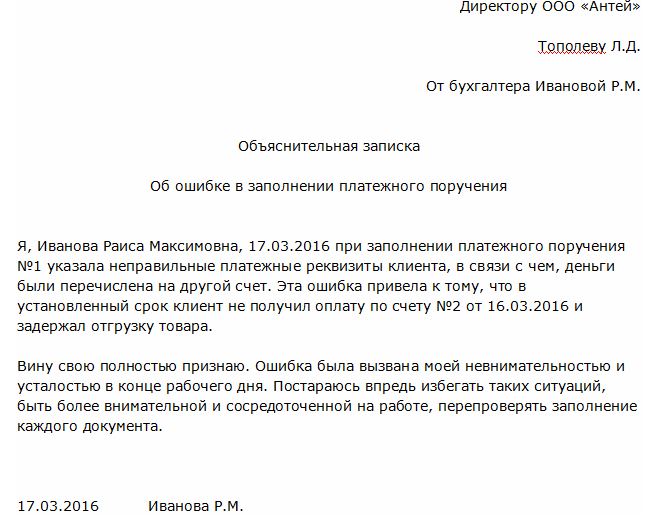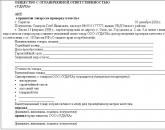How to write an explanatory note about a mistake at work
This happened. Job. Error. "Write an explanation!" - pursed lips, a trained bossy look at point blank range. Such a requirement is fraught with bad and at the same time legal consequences. They can be minimized if you know what the document threatens, how and what to write about, what to do. It is good to have before your eyes a sample explanatory note about an error in work. The article will tell about these things.
An explanatory note is drawn up by an employee upon presentation of claims about non-fulfillment or improper fulfillment of duties. It outlines the reasons for the current situation. On its basis, management determines whether the employee is guilty or not, and to what extent. As a result, the proceedings decide on the issue of punishment. There are three options:
- termination of claims;
- employee forgiveness or verbal warning;
- disciplinary action.
Let's consider the last case.
The Labor Code of the Russian Federation (Article 192) allows disciplinary sanctions in the form of:
- remarks,
- reprimand
- layoffs.
The employer is not entitled to use other punishments (including “fines”). At the same time, he can prescribe in the internal documents of the company the impact of these sanctions on bonuses.
Information about comments and reprimands is not entered in the work book.
The employer has the right to dismiss an employee (clause 5, article 81 of the Labor Code of the Russian Federation) if he fails to fulfill his labor duties without good reason, with an already unremoved disciplinary sanction for the same reason. The last one is valid for 1 year.
A disciplinary sanction can be applied no later than 1 month from the day the misconduct was discovered and 6 months from the day it was committed. For facts that are discovered during an audit, audit or financial inspection, this period is extended to 2 years.
An explanatory note is an integral part of the procedure, which can have far-reaching and unpleasant consequences for the employee. They can be reduced if the document is prepared correctly.
To write or not to write
Is it possible to refuse the authorities and not write an explanatory note? Yes, you can. The employee has this right. The actions of the administration to enforce this are considered illegal.
On the other hand, the absence of a written explanation will not help the employee avoid disciplinary liability (Article 193 of the Labor Code of the Russian Federation). The employer will issue an act of refusal. The defendant's signature is not required. The collection process will continue.
The explanatory note provided will document the valid reasons for the incident that the employee has. It will not allow the administration to interpret his actions at its own discretion. The employee will better understand the vulnerabilities of his position.
The process has begun
The employer can request an explanatory note in writing or orally. At the same time, he is obliged to describe the fact of violation and demand an explanation. A written request is handed over on paper with a mark of receipt. It can take the form of a demand, an order, an order.Oral request causes discussions among lawyers. One position: the employee in this case should not provide a written explanation. It is necessary to politely insist on a paper version of the demand or give oral comments about the incident. The reason is unrecorded claims of the employer. It will also be difficult for the latter to prove the fact of the request in court - witnesses will be required.
Another position: to give an explanatory and in the case of an oral request. Argument - if necessary, the employer will easily issue a written request and submit it to the court.
Softness should not be abused. If the boss cannot clearly say for which violation an explanation is required, then it is necessary to insist on a written request. It is better to do this with the help of a written statement to the employer. It should show the situation in detail (dates, participants, uncertain requirements).
An explanatory note can be requested by the head of the organization or a person authorized by him. If such an initiative comes from the immediate superior, it is not recommended to require confirmation of these rights from him. On the one hand, if the case goes to court, he will be interested in the legality of the penalty, and not in the personality of the person who requested the explanation. The employer, if necessary, will confirm the authority. On the other hand, such a requirement will further aggravate the relationship of the employee with the administrations.
A written explanation is provided within two working days in accordance with the Labor Code of the Russian Federation. The date of receipt of the request is not included.
Do not succumb to pressure from superiors and write an explanatory note "right now." It is necessary to remove the first nervous excitement and analyze the situation in a calm atmosphere. Read the manual again. Consult a lawyer. Then start writing.
 An explanatory note should be written on the basis that in the end it will end up on the table of the judge. The purpose of the author is to clearly characterize himself as a law-abiding citizen who is ready to perform the work provided for by the employment contract.
An explanatory note should be written on the basis that in the end it will end up on the table of the judge. The purpose of the author is to clearly characterize himself as a law-abiding citizen who is ready to perform the work provided for by the employment contract.
The manager does not have the right to influence the document: dictate the text, demand rewriting, indicate "this is not the reason." The content of the explanatory note is determined by the employee.
The text of the note is concise. Non-mandatory information may cause unnecessary questions from superiors. Jokes and colloquial expressions are inappropriate. The tone of the story is respectful. If the proceedings go to court, the reputation of a boor will not help win the case. The presentation is in chronological order in the first person.
- confirm or deny the fact of violation;
- describe the circumstances of the event (date, time, place), its causes;
- characterize guilt: intentional, through negligence, its absence;
- bring witnesses;
- to express an opinion on bringing to responsibility;
- describe the attitude towards further work.
Reasons for the error
Consider common options.
- High workload is a consequence of the peak of work, incomplete staff. The explanation is good because it shifts the responsibility to the employer. Suitable for small division. Does not work in a large team working under the same conditions (at least formally). The authorities jealously guard their infallibility in the distribution of the workload. If the reputation of a lazy squabbler is undesirable, it is better to find other reasons.
- Little experience - works in the case of a young specialist.
- Poor health can serve as an excuse. The employee should emphasize that he worked in such a state because of concern for the enterprise, the continuation of its rhythmic activities.
- Personal, family circumstances - can help if the cause is serious. You should not abuse this tool.
- A vaguely written, inconsistent clause in a job description that allowed for misinterpretation. The argument is suitable for use, but it is better to stock up on a certified copy of this document first.
Other members
If other persons were involved in the incident, impartially inform what each of them did. Do not directly name the culprit. This is the right of leadership. But it must receive sufficient information for such a conclusion. You shouldn't lie. In such a story, explanations are written by all participants, and the truth will come out.
denouement
The employee should definitely describe his conscientious work path with the employer, mention the absence of disciplinary sanctions in the past, list the incentives received (bonuses, diplomas, gifts). If the case goes to court, this information will be taken into account when making a decision.
If the employee admits guilt in the mistake made, it is necessary to express repentance. It is also necessary to assure management that such cases will not happen again in the future.
How to compose
There are no statutory standards for the preparation of a written explanation. It is enough to follow the minimum general rules for preparing documents.
The note is prepared on an A4 sheet. It can be written by hand or typed on a computer.
At the top of the sheet, on the right side, the column indicates to whom and by whom the document was sent. Recipient - the person who requested the explanation. His position, surname, initials are given. The employee writes his unit, position, full name.
A few lines below, in the center, the name of the document is indicated - an explanatory note. The text of the explanation follows.
Then the position drawn by hand, personal signature, initials and surname of the employee are affixed. The date of the note is indicated. The employee has the right to attach documents confirming his information.
The explanatory note should be registered at the office, having received a copy or a 2nd copy of the note with the appropriate mark. This will protect against possible illegal actions of the administration.
Example
Director of Prod-service LLC
N.N. Nikolaev
from an accountant
Ivanova Irina Ivanovna
Explanatory letter
On February 12, 2016, I entered the wrong prices on the consignment note #331 and invoice #434, overpricing by 5%. The buyer therefore refused to accept the goods, and he was returned to the warehouse. The error was caused by an increased workload that day. The reason is the absence of the accountant Rakova E.E., who was on time off. I served as two people. I acknowledge the mistake. I ask you to take into account that earlier there were no claims to my work from Prod-service LLC. In the future, I undertake to be more careful when filling out documents.
Accountant I.I. Ivanova
Outdated form or article? Please click!
The form is outdated The article is not relevant Other
Popular
- How to get a TIN: possible ways
- What kind of business can you do?
- Written notice of termination of the lease
- Business from scratch. Things to do?
- Cost of goods sold: formula, methodology and calculation example
- How to write a vacation application - examples
- What kind of business can be opened in a small town or village?
- The formula for calculating the cost of services, products sold and total cost
- Sample memorandum: I bring to your attention
- Example of an explanatory note for being late for work




